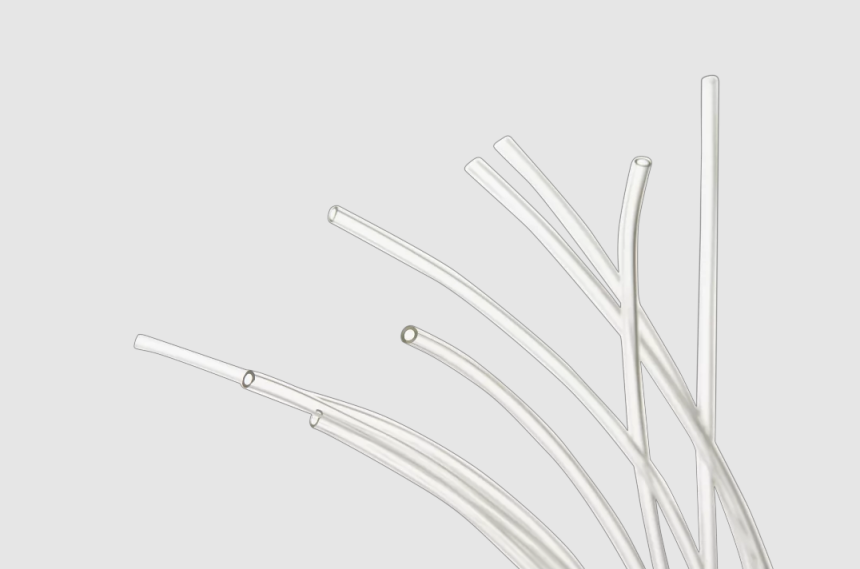Envision a scenario where medical interventions are not merely safer but also markedly more efficient. Imagine if the instruments employed by healthcare practitioners could be tailored to address the distinct requirements of each individual patient, thereby boosting both accuracy and results. Introducing the TPU guidewire—a groundbreaking leap in medical technology that is revolutionizing the realm of minimally invasive procedures.

Comprehending TPU Guidewire
Defining a TPU Guidewire
TPU (thermoplastic polyurethane) guidewire is a specialized medical device. Used to navigate complex pathways through the human body during various surgical and diagnostic procedures. Compared to traditional guidewires made of metal or other non-flexible materials. TPU guidewires offer excellent flexibility and biocompatibility, making them ideal for delicate and precise medical interventions.
Renowned for its outstanding mechanical attributes and compatibility with biological tissues, TPU strikes an optimal balance between pliability and strength. This equilibrium ensures that the guidewire can navigate through intricate anatomical structures without inflicting trauma or discomfort upon the patient. Additionally, TPU guidewires are usually coated with advanced substances. To reduce friction and enhance visibility under imaging technology, thus enhancing its overall functionality.
Benefits of TPU Guidewire
The integration of TPU guidewires into medical practice offers a multitude of advantages. First, its enhanced flexibility allows it to more smoothly navigate through winding blood vessels and complex body passages. This reduces the risk of complications during the procedure. This adaptability also helps to create a more comfortable experience for patients. This is because the guidewire can follow the natural movement of the body without applying excessive pressure or causing injury.
Additionally, TPU guidewires demonstrate exceptional biocompatibility, which significantly reduces the likelihood of adverse reactions when in contact with bodily tissues. This characteristic makes them particularly suitable for prolonged applications and use in sensitive regions of the body. Moreover, the durability of the material ensures that the guidewire maintains its structural integrity throughout the procedure, offering dependable performance even under challenging conditions.
Lastly, the customizable nature of TPU guidewires enables healthcare providers to tailor the device to meet specific procedural demands. This degree of customization enhances the precision and effectiveness of medical interventions, ultimately resulting in improved patient outcomes and higher rates of procedural success.
Utilizations in the Medical Sector
TPU guidewires find applications across a diverse array of medical specialties, including cardiology, interventional radiology, and neurosurgery. Within cardiology, they play an essential role in angioplasty and stent placement, allowing cardiologists to navigate coronary arteries with remarkable ease. In the field of interventional radiology, TPU guidewires assist in the placement of catheters and other devices during minimally invasive, image-guided procedures.
In neurosurgery, the intricate nature of operations involving the brain and spinal cord necessitates the use of highly flexible and precise guidewires. TPU guidewires fulfill these requirements, enabling neurosurgeons to conduct complex interventions with minimal risk to adjacent tissues. Additionally, their biocompatible properties make them suitable for incorporation into implantable devices and long-term therapeutic applications.
Tailoring Your TPU Guidewire: A Comprehensive Guide
Step 1: Evaluating Clinical Needs
The initial phase in customizing a TPU guidewire involves a meticulous evaluation of the clinical needs specific to the intended procedure. Healthcare providers must take into account factors such as the anatomical pathways involved, the duration of the procedure, and the particular mechanical properties required for optimal performance.

By partnering with a reputable supplier like Demax, medical professionals can access expert guidance and support in determining the ideal specifications for their custom guidewire. This collaborative approach ensures that the final product precisely aligns with the procedural requirements, thereby enhancing both safety and effectiveness.
Step 2: Choosing the Suitable TPU Material
Once the clinical needs have been clearly defined, the subsequent step is to select the appropriate TPU material. TPU is available in various grades and formulations, each offering different levels of flexibility, strength, and biocompatibility. The selection of material directly influences the guidewire’s performance characteristics, such as its capacity to navigate complex pathways and its resistance to wear and tear during use.
Demax, a leading supplier of TPU guidewires, provides a diverse assortment of TPU materials tailored to meet the specific demands of different medical applications. By selecting the appropriate material, healthcare providers can ensure that their customized guidewire delivers optimal performance and reliability within clinical settings.
Step 3: Configuring the Guidewire Design
The design phase encompasses determining the specific configuration of the guidewire, including its diameter, length, and tip design. These parameters must be meticulously chosen to correspond with the anatomical and procedural requirements identified during the initial assessment. For instance, a guidewire intended for coronary arteries may necessitate a smaller diameter and a more flexible tip compared to one designed for neurovascular interventions.
Customization options may also extend to incorporating specialized coatings or markers to enhance visibility under imaging systems or to reduce friction during navigation. Collaborating with Demax allows healthcare providers to utilize advanced design capabilities and expertise, ensuring that the guidewire is precisely tailored to the unique needs of each procedure.
Step 4: Prototyping and Validation
Following the finalization of design specifications, the next step involves creating prototypes of the customized TPU guidewire. Prototyping facilitates the assessment of the guidewire’s performance in simulated clinical scenarios, identifying any potential issues or areas for improvement prior to full-scale production.
Demax employs rigorous testing protocols to guarantee that each prototype adheres to the highest standards of quality and performance. This iterative process of testing and refinement ensures that the final product delivers reliable and consistent results in real-world medical applications.
Step 5: Final Manufacturing and Quality Assurance
Once the prototype has been validated, the final manufacturing phase commences. Demax utilizes state-of-the-art manufacturing processes to produce customized TPU guidewires that comply with stringent quality standards. Each guidewire undergoes comprehensive quality assurance testing to verify its adherence to medical regulations and performance specifications.
This meticulous production approach ensures that healthcare providers receive guidewires that are not only customized to their specific needs. And it also meets the highest levels of safety and effectiveness. Working with a trusted supplier like Demax gives them peace of mind, knowing that their custom guidewires are manufactured with precision and care.
Why Opt for Demax as Your TPU Guidewire Supplier
Expertise and Innovation
Demax distinguishes itself in the medical device industry through its steadfast commitment to innovation and excellence. With extensive experience in TPU guidewire development and manufacturing. Demax solidifies its reputation as a reliable partner for healthcare providers and distributors. They have a deep understanding of medical applications and the unique challenges faced by practitioners. This allows them to provide effective and reliable solutions.
By continuously investing in research and development. Demax remains at the forefront of advances in TPU guidewire design and production technology. This dedication to innovation ensures that its products feature the latest features and enhancements. Empowering healthcare professionals with cutting-edge tools to improve patient care.
Customization Expertise
A key strength of Demax lies in their comprehensive customization capabilities. Acknowledging that each medical procedure may present unique requirements, Demax offers a highly adaptable approach to guidewire customization. From selecting the right TPU material to designing a specific configuration and integrating specialized coatings. Demax works closely with customers to develop guidewires that meet their exact specifications.
Differentiate its services and improve surgical outcomes. Whether it is a specialized surgical procedure or a high-volume diagnostic procedure. Demax can customize its products to meet a wide range of clinical needs.
Commitment to Quality and Compliance
Quality is of utmost importance in the medical device sector, and Demax places a significant emphasis on maintaining the highest standards in their manufacturing processes. Each TPU guidewire undergoes stringent quality control measures to ensure consistency, reliability, and safety. Demax adheres to international medical device regulations and standards, providing healthcare providers with products they can trust.
Furthermore, Demax’s commitment to quality extends beyond production to include comprehensive support and after-sales service. Their team of experts is readily available to address any concerns, offer technical assistance, and ensure that clients receive the best possible experience with their customized TPU guidewires.
The Future of TPU Guidewires in Medical Healthcare
Progress in Material Science
The domain of material science is perpetually advancing, presenting new opportunities to enhance the performance of TPU guidewires. Ongoing research into advanced TPU formulations promises to yield guidewires with even greater flexibility, strength, and biocompatibility. These advancements will facilitate the development of guidewires capable of navigating increasingly complex anatomical structures with ease, thereby broadening their applications across various medical specialties.
Additionally, innovations in coating technologies are anticipated to improve the lubricity and visibility of TPU guidewires, further enhancing their usability in clinical environments. These improvements will contribute to more efficient procedures, shorter procedure times, and superior overall patient outcomes.
Integration with Digital Innovations
The fusion of TPU guidewires with digital technologies is poised to revolutionize medical procedures. Smart guidewires equipped with sensors and wireless communication capabilities can deliver real-time data on their position, movement, and the forces exerted during navigation. This information can be invaluable for healthcare providers, offering enhanced precision and control during minimally invasive procedures.
Moreover, the synergy between TPU guidewires and advanced imaging systems can lead to more accurate diagnostics and targeted interventions. By harnessing digital technologies, TPU guidewires will play a pivotal role in the next generation of personalized medicine, where procedures are meticulously tailored to the specific needs of each patient.
Expanding Global Market Presence
As the advantages of TPU guidewires become increasingly acknowledged, their adoption is expected to proliferate across global markets. Healthcare providers in emerging economies will particularly benefit from the accessibility and adaptability of custom TPU guidewires. Thereby improving the quality of care and patient outcomes in a region with expanding medical infrastructure.
Resellers and distributors will also encounter significant opportunities in the growing market for TPU guidewires. By partnering with reputable suppliers like Demax, they can offer high-quality, customized solutions to a diverse clientele, thereby driving growth and innovation within the medical device industry.
Conclusion
The TPU guidewire signifies a monumental advancement in medical technology, offering unparalleled flexibility, biocompatibility, and customization options that enhance the precision and safety of minimally invasive procedures. By collaborating with a trusted supplier such as Demax, healthcare providers and resellers can leverage the latest innovations in TPU guidewire design and manufacturing to improve patient outcomes and expand their service offerings.
With the continuous development of materials science and digital technology. The future of TPU guidewires is very bright, with endless possibilities for further improvements and applications. Adopting this transformative technology will not only improve the standard of care. It could also pave the way for a new era of personalized and efficient medical intervention.